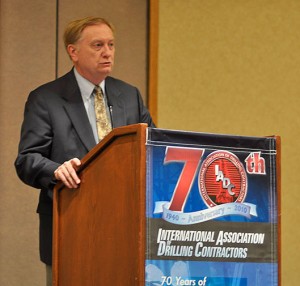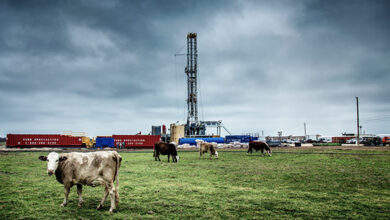Industry gears up for fight over hydraulic fracturing

Citing a line from the movie “The Untouchables” where a character tells another to bring guns to a fight if the enemy brings knives, Lee Fuller, VP – government relations of the Independent Petroleum Association of America (IPAA) told the industry that, in the fight over hydraulic fracturing, right now we’re the ones bringing the knives. We need to step it up, he said.
“I’ve never seen an environmental issue with a more benign history and a better risk management being stigmatized as aggressively and as callously as hydraulic fracturing,” Mr Fuller said during the keynote address at the IADC Annual General Meeting, 10-12 November in San Antonio, Texas. Not only have public debates grossly mischaracterized the nature and risks of hydraulic fracturing, but “we can’t actually point right now to a single case of drinking water damage as a result of the hydraulic fracturing process.”
He warned that the enormous conflict over hydraulic fracturing is really just one part of a larger effort. It “is being used in some respects as just a surrogate to attack the entire oil and gas drilling process… We’ve seen, particularly over the past five to seven years, a very aggressive state and local targeted process primarily focused on hydraulic fracturing because it’s got such a linchpin role in the development of our shale formations. If you can stop fracturing, you can stop that development,” Mr Fuller said.
And hydraulic fracturing has been a great opportunity for industry opponents, if simply because most people have no idea what hydraulic fracturing really is. Not only that, but “it is something that easily confuses, it can be used to frighten people, and that’s what’s being done on a recurring basis.”
Although the mechanical aspects of hydraulic fracturing have been discussed, now the chemical side of the process is emerging as another topic of debate. “People don’t understand why the chemicals have to be there – why you need a biocide, why you need a surfactant, why you need a breaker. All the different functions that go on in the chemicals process are not understood and have opened the door to the ability to challenge the use of those chemicals as part of the fracturing process,” Mr Fuller explained.
In the Marcellus Shale, a particular challenge is the fact that communities in that region don’t have a long-term history associated with oil and gas development. “Therefore they’re far more susceptible to allegations of what may be happening. And if you spend enough money doing that, you can get a really strong response,” Mr Fuller said.
With the US Environmental Protection Agency again taking up the study of hydraulic fracturing and looking at the risks it may pose to drinking water, industry is working aggressively to deal with the study process, as well as the politics involved, Mr Fuller noted.
One effort is that industry groups, including API, IPAA and IADC, have formed an entity called Energy In Depth. The group is undertaking “very aggressive monitoring of allegations that are made throughout the country – news articles, statements on TV, radio, in debates – to respond when those issues are raised to make sure that our side of the argument is heard,” he said. A website has also been established to educate the public about domestic energy production.




